#free meta
Explore tagged Tumblr posts
Text

@sweetyourocksweetyouroll
#dash did a thing#...five months ago 😅#but still!#free meta#(better believe I've got that other post ready to go!)
9 notes
·
View notes
Text
I was a kid with a Hunger Games hyperfixation and, from time to time, I'll get reminded of the books. With Trump's inauguration and the TikTok ban and unban, I can't stop thinking about a political tactic called panem et circenses, or bread and circuses.
In Mockingjay, Collins writes "'It’s a saying from thousands of years ago, written in a language called Latin about a place called Rome,' he explains. 'Panem et Circenses translates into "Bread and Circuses." The writer was saying that in return for full bellies and entertainment, his people had given up their political responsibilities and therefore their power.'"
In Collins' world, the Hunger Games was the entertainment. In ours, it's social media. Twitter, Meta, TikTok, are all controlled by political powers. Musk, Zuckerberg. TikTok is owned by Yiming and Rubo, but with the ban and unban, the content it shows in America is filtered to fit Trump's political agenda.
It's entertainment at the cost of information.
#looking at the hunger games as a kid like 'wow look at that logical extreme'#growing up and seeing it happen#this shit's fucking unreal#the hunger games#mockingjay#quotes#book quotes#donald trump#america#us news#us politics#i try not to make too many political posts#but it's hard not to speak up when fundamental human rights are being violated#and free speech is being silenced#the hunger games was a comforting nightmare as a kid#because it was so unrealistic#the parallels are getting to close#tiktok#tiktok ban#panem et circenses#bread and circuses#twitter#elon musk#meta#facebook#instagram#mark zuckerberg#social media#free speech#zhang yiming
2K notes
·
View notes
Text
"I've been waiting for ages for somebody to unmask them."

This moment tends to elicit negative reactions in a first read through, and I've got some opinions about why where Kabru is coming from here actually makes a lot of logical sense. So I thought I'd elaborate on that.
I think people hear this and go, "He thinks they must be hiding something because they gave money to someone? What a cynic." Or "he dislikes them because they did charity?? What's wrong with this guy!". And obviously, a lot, a lot is wrong with him. But I think this makes more sense than it seems at first glance! What people evaluating this judgement miss is why Kabru is paying attention to Laios and co to begin with.
Kabru knows of the Touden siblings because (he's a little bit of a stalker-) he is keeping an eye on all the relevant parties in events developing on the island, in order to be able to guide them to his preferred outcome. This includes adventurers because they are the ones actually exploring the dungeon! He's well aware that something as minor as internal tensions between party members could be key to the historical events that are developing. (He would love the assassination of Archduke Franz Ferdinand.)
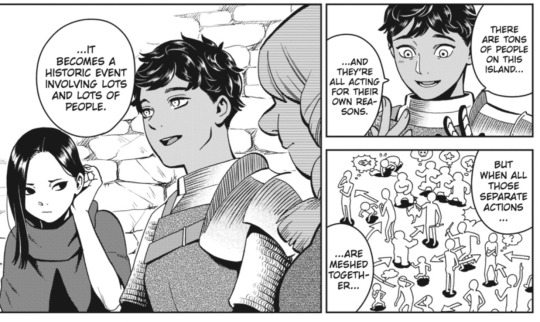
His desired outcome is that whatever the rewards are of breaking the dungeon's curse, whether that's kingship or the ancient elven secrets of dungeons, are claimed by:
A) a short lived person
B) Someone who will be a good, effective leader and/or use those secrets and the power they carry wisely, with foresight, and to establish a political bloc for short lived people.
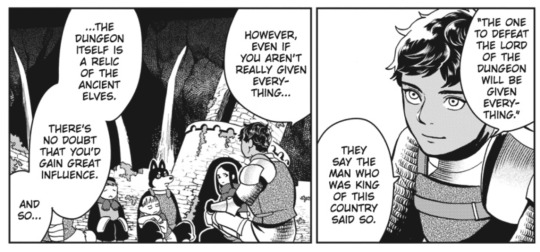
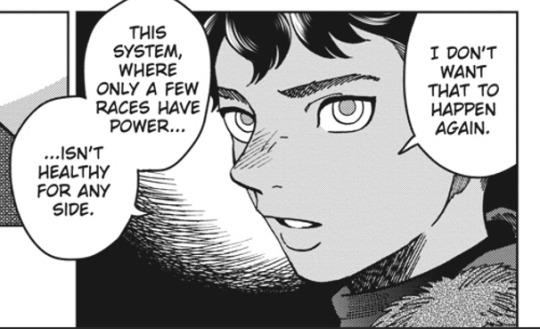
The person he can best trust to do this is, of course, himself. But due to his PTSD regarding dungeons and monsters, he's not able to develop the necessary skills to conquer the dungeon. Once he realises this, he starts looking for someone else who he can support to that end.
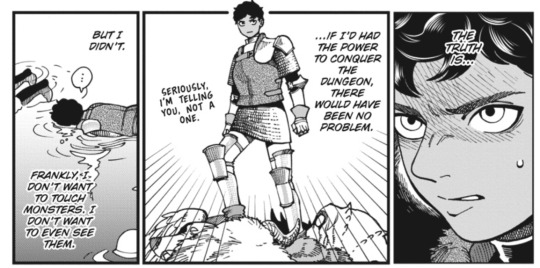
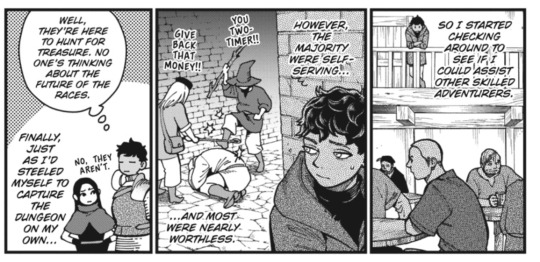
But most of the adventurers don't have any intentions of conquering the dungeon, don't have the skills, or are unsuitable in other ways. In fact, it seems like some potentially suitable people are the Toudens. There are a lot of good rumours about them going around - they actually seem to have a very positive reputation! That's what Kabru means when he says "unmask".

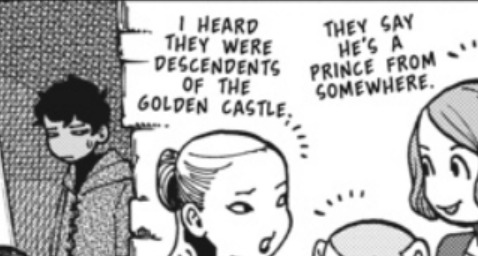

So when Kabru is observing something like them giving money to an old comrade from their gold-peeling days, he doesn't consider it a problem because "they're giving money to this person who doesn't actually need it" or because they must have some dark secret if they act superficially nice. I think he actually understands this situation and what it implies about Laios (in particular) perfectly well.
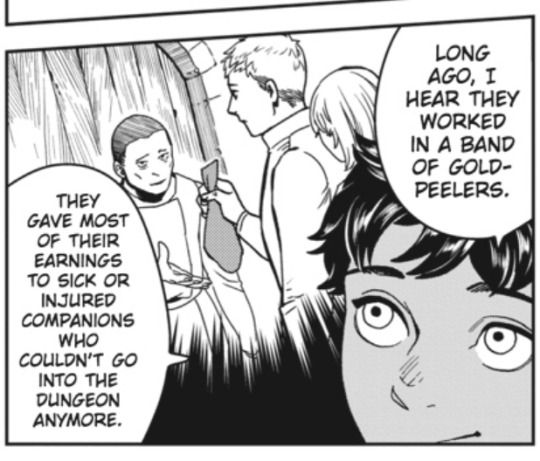
Laios and Falin gave money to an old comrade who got injured and couldn't work. That person then healed up but kept taking their money. Then he used the money to start smuggling illicit goods to the island.
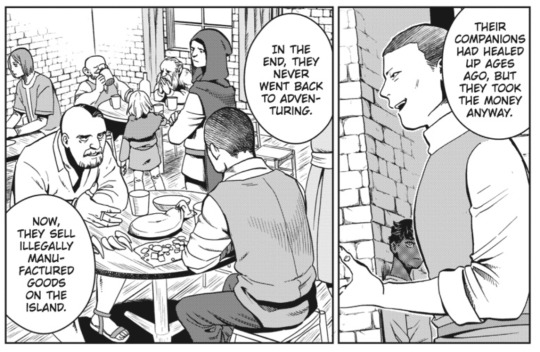
The key is that for Kabru, the problem here is the same as with the corpse retrievers - people using the dungeon's resources to fuel dangerous, selfish, or violent pursuits cause problems for the island, attract more criminals and people with motives other than breaking the curse, and increase the chances of the whole situation ending in tragedy.

Kabru is willing to work with the Shadow Lord of the island if it gets him to his goal - he isn't scrupulous - but the criminal element of the island increasing is something he sees as a major issue.
Also, when you're evaluating someone as a candidate for power, riches, secrets, potentially kingship - then being curious about how the money you give to people is going to be used is kind of a relevant trait!
Interpersonally, Kabru's actually very easygoing - I mean, Mickbell isn't exactly an upstanding guy, is he! But Kabru likes him and they get along well. These traits wouldn't be a problem at all in a friend, or a comrade, or someone Kabru was confident he could use. But he can't get a handle on Laios, and Laios is someone who has the potential to be a major player!
On Laios' end, this is the same as with the marriage seeker who joined their party. She kept asking for things and he gave them to her, because he tries to be nice to others. He even gives her money! It's the exact same thing.
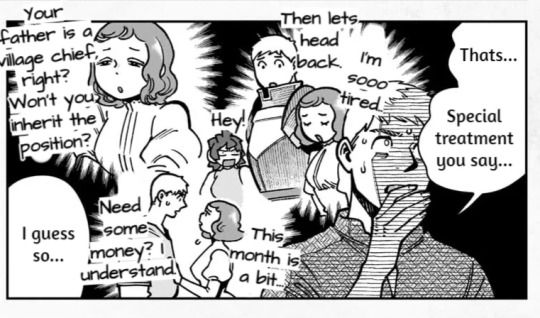
That's fine, but it became a problem because he basically wasn't interested in her motives, didn't notice she was trying to manipulate him, and it also didn't occur to him that the other party members would notice or be affected. We can assume the situation with the gold peeler is the same. When Kabru says that "It's not that they're bad people, they just aren't interested in humans," he isn't wrong.
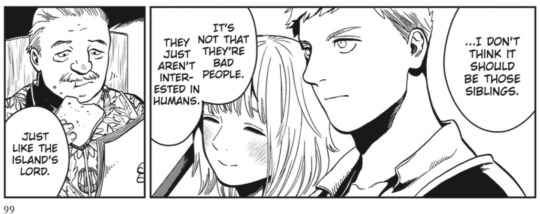
The extent to which this is true of Laios is linked to his autism imo, (because it isn't just disinterest - he genuinely isn't able to notice nonverbal cues that people are lying to him or have ulterior motives) but to a greater or lesser extent I think it's a very common trait. Most people aren't actually that interested in other people who aren't close to them. Kabru is the weird one here. It isn't an issue except as a leader - which is why we see an immediate comparison to the Island's Lord, because that's how Kabru is evaluating them.
And disinterest in/lack of ability with people to the extent Laios exhibits it, it does, actually, make him a worse leader... it's just that as we see in the story, people can help him out. The rest of the party tell him the marriage seeker is taking advantage of him so he tells her he can't give her special treatment anymore. They're pissed and it's a crisis point - he couldn't have recovered their trust without Marcille and Falin - but that's exactly the point. With Marcille and Falin, he was able to recover their trust.
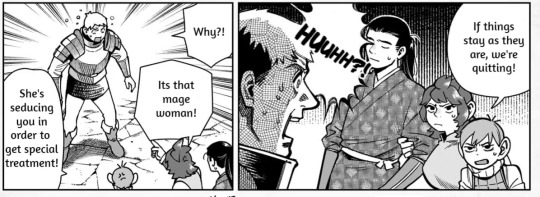
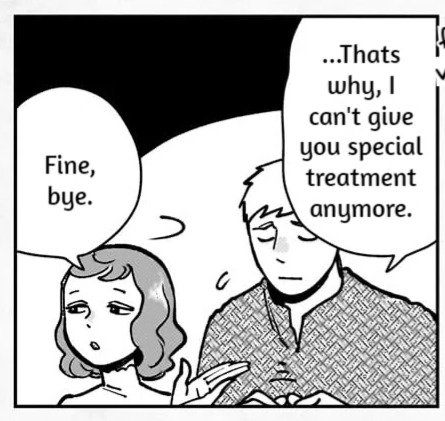
And he has other good traits that make up for it, such as his intelligence, strategic knowledge, open-mindedness and sense of fairplay.
Kabru doesn't disqualify Laios as a candidate based on what he sees about him from afar, though - he still tries very hard to get close to him, obviously hoping that if he manages he can steer Laios to defeat the dungeon and make up for his lack of people-skills in the aftermath. (Which... he does eventually achieve that goal!) He completely fails until the events of the story, so... definitely I think "They just aren't interested in humans" could also partially be a stung reaction to Laios' complete disinterest in him.
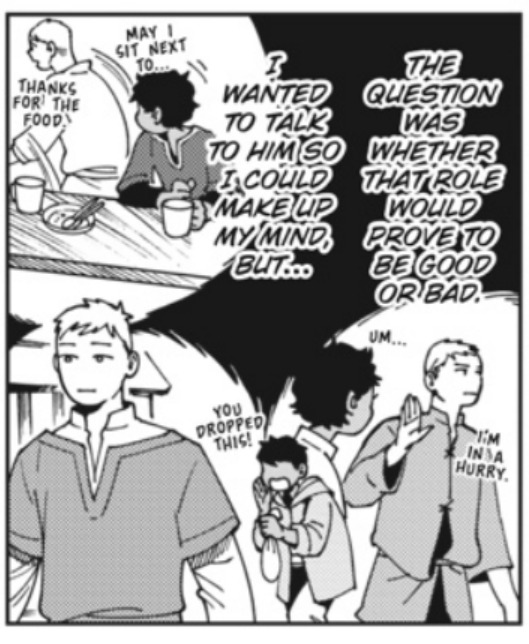
Anyway, that's my read on what exactly Kabru's "issue" with Laios is. Obviously, once he does find out what Laios' true nature is like - about his love for monsters - he develops an entirely new set of fears about Laios' priorities. But since Laios kept that a secret until the start of the story, he has no idea of that yet.
Given all that, I think it's interesting that he says that he doesn't think that the Toudens are suitable to defeat the dungeon, and that he's hoping they'll turn out to be the thieves. As some of his few potential candidates, people who he thinks may play a big role in the island's future, you'd think he'd hope they would be good people!
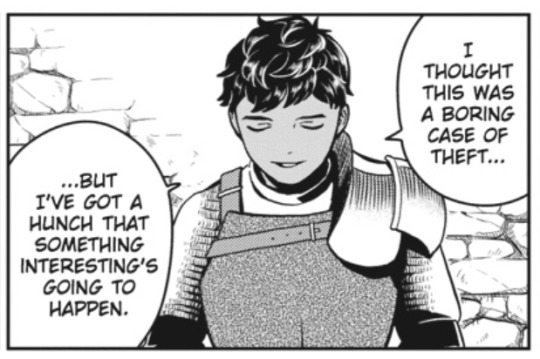
I suppose it's better, in his eyes, because it means that he's involved in something "interesting". They haven't just had their stuff stolen by regular criminals (boring, puts them further away from his goal) - they've been caught up in the beginning stages of "a historic event". The desperate and dwindling group forgetting morals in their quest to retrieve their lost comrade probably appeals to his sense of melodrama. Because he also just... loves drama.
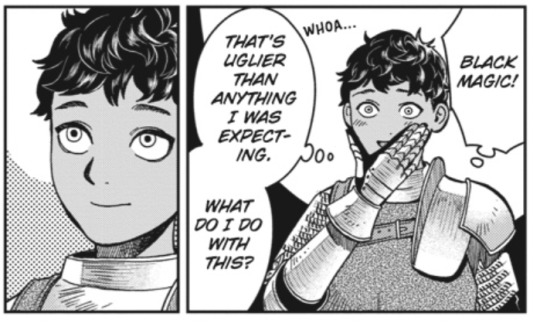
Despite it being "uglier than anything he was expecting", he still pursues Laios as the person he wants to conquer the dungeon pretty much as soon as it becomes clear that he won't be able to do it himself and they are out of time. That's because... well, to be fair, there aren't any other options. And he fits standard A: he's short-lived!
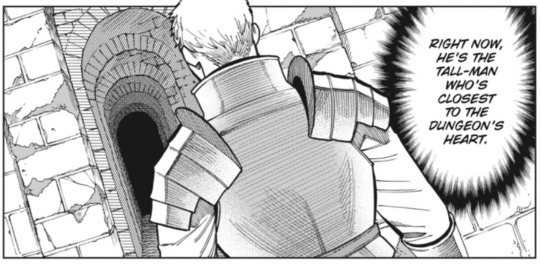
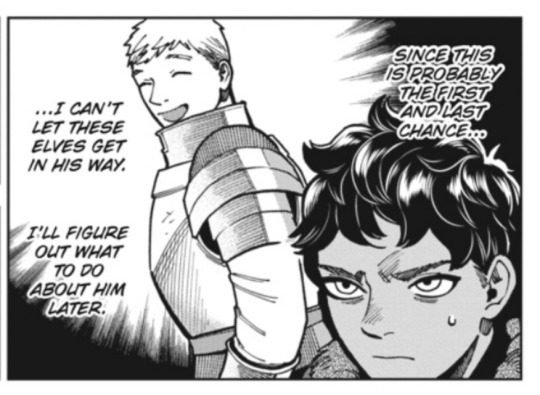
and Kabru still hopes he can fit standard B, too, and be persuaded to use the power he wins for good. No matter how many nightmares he has about Laios, or whether he thinks about killing him. He doubts him, but ultimately he puts his faith in him and seems happy after the manga's ending that he made the right decision.

#dungeon meshi#dungeon meshi manga spoilers#dungeon meshi meta#kabru of utaya#laios touden#labru#laios x kabru#dunmeshi#og post#kabru is such a big picture thinker. and he evaluates people more than he judges them imo#the hater jokes are funny but the people he judges most harshly arent laios and co. they're people like the island's lord.#but you don't see that as clearly because he isn't interested in the island's lord. he understands him. finds him contemptible but useful.#whereas laios lives in his brain rent free because he WANTS to understand him but doesnt quite.#even though he sees the elves as a major threat to his ultimate goals and dislikes the way they treat short lived races#he still understands and evaluates mithrun as an individual based on his own merits#he's one of the characters who is least judgemental in that sense because while he's always making judgements and evaluations#he's also constantly revising them whenever he gets more information#my beautiful machiavellian prince <3#it's genuinely a really laudable way of understanding others imo.#the only problem is that because he's driven towards his goals by his PTSD and survivors guilt#he pushes himself into situations (the dungeon and also interpersonally) that trigger him or even just upset him#without regard for what he authentically wants or his own wellbeing.
4K notes
·
View notes
Text
🇵🇸 IMPORTANT. Please share. 🇵🇸
If you have Instagram, Meta has set an automatic limit on "political content" as a means to stop the spread of awareness about Palestine, Sudan, Congo and more places where genocide and injustice are being enacted.
You can remove the limit in your settings. Instructions:
1. Go to Settings and Activity
2. Scroll down and click go to Suggested Content

3. Click on Political Content
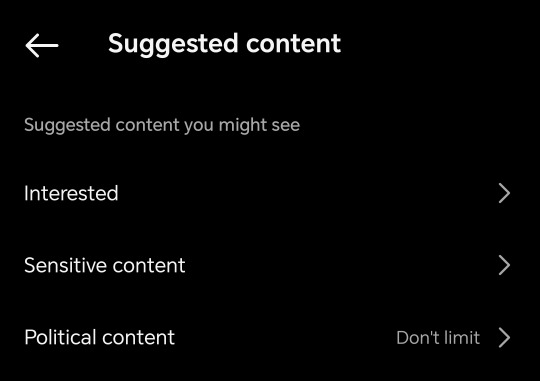
4. Select "Don't Limit"

Please share so more people know about this and what to do
#instagram#meta#palestine#congo#sudan#important#please reblog#dont stop talking about palestine#keep talking about palestine#free palestine#gaza#free gaza#from the river to the sea palestine will be free#i stand with palestine#rafah#save rafah#human rights#social justice#social media
5K notes
·
View notes
Text
Jason and Cass' opposing views on murder is so interesting. Their conflict is not purely moralistic - that is to say, it's not purely that Jason thinks murder is okay, and Cass doesn't. It's their identities, their original and most fundamental worldview. Jason is a murder victim and Cass is a murderer. Yes, Jason kills people as Red Hood, and yes, Cass dies multiple times, but this never truly erases how they see themselves. Jason will always have been murdered, and Cass will always be a murderer. They are unable to fully extricate themselves from those roles, and thus will never approach life or death the same way.
#cassandra cain#jason todd#so i may have spent thirty minutes reading jason meta#cass will always be my fav but damn if jason meta doesn't hit on a spiritual level#that boy is messed up#idk if this post makes any sense?? jason experts feel free to correct me#it's interesting too how so much of their trajectory is trying to change that identity as victim or villain#jason becoming red hood is creating the autonomy being a victim denied him#cass becoming batgirl is creating the autonomy being a (forced) murderer denied her#yet they both are unable to truly let go of what the world made them#thus both being perpetually haunted by their past selves#meta
3K notes
·
View notes
Text
So I read a prompt about how Wonder Woman found Danny in a trash can (don’t remember which one) and I was bored.
So I took that lil info and made it into an AU.
So basically, Danny get yeeted into this unknown universe and has no where to live. And no where to live means no money. No money means no food. No food means Danny can’t keep his human half sustained.
So what does he do?
Decides to not change into a human and live in a trash can.
Yes you heard that right, live in a trash can.
Because he’s a ghost, he doesn’t have to worry about the germs and stuff. But that doesn’t mean he lives in just any trash can! He lives in a clean one ☝️
AND he also decorated it with his name so other people know it’s his!
And so Danny has been here for a while now and realizes
Holy shit there’s hero’s here- you know what, why doesn’t he have hero’s back home?!
And being minorly annoyed jealous (but he’s never admitting that)he thought:
Well since there’s hero’s here already, guess I’m not needed.
.
.
.
Good. I’m tired af
And so Danny caries on his life, being content with his trash can and scaring whoever comes into his alley. It’s fun. Sure he sometimes needs to ugh overshadow people to feed his human side, but other than that.
It’s going great.
But Danny doesn’t realize that with Amity gone (or smth, you choose) which was his haunt, he slowly makes the trash can into his new haunt.
And slowly but surely, Danny’s beloved haunt trash can starts to become other worldly kinda.
Yk because of the ectoplasm.
So now Danny’s lovely trash can haunt has more space inside and- Hey Danny can actually sleep in it better!! And he got some company too!
In the form of blob ghosts.
Two actually.
They keep his trash can clean and help purifying some corrupted ectoplasm that he finds. Because for some reason this universe’s ectoplasm seems half way artificial and tastes a bit weird. Which is where the blob ghosts help out in.
Everything was great.
Danny was loving the trash can life style.
He has two blob ghosts friends. Which he named Sam and Tucker, and yea they couldn’t talk but that was fine.
He wasn’t lonely, he wasn’t. He had two very much talking friends like Sam and Tucker.
However one day two weirdly dressed people- oh they were hero’s.
Well anyway they found him, one woman stripper and one furry guy.
But it was on accident! He was just peaking out of his beloved haunt trash can, and they spotted him.
He stared, they stared back.
Then the woman stripper asked him questions, even when he said:
“Don’t mind me, have a nice day!”
But they just kept bother him and giving him weird looks and glances.
Which- rude.
Didn’t they see his mark on his haunt trash can? Obviously it means it’s his home, so they shouldn’t be bothering him still. He’s safe as can be.
Plus.
It’s not like he’s looking at them in suspicion and weirdness, I mean look at them! What kinda cheep knock off vampire fury mix and American stripper style clothing are those!
They should mind their own business!
———
Just a silly lil drawing of this lmao, don’t mind me.

#dp x dc#fan art#danny phantom#dc universe#Danny saw a clean un-used trash can in an alley which no one normal came into and went: Yes.#The trash can is his Haunt now B-!#Danny has fun scaring the few people who actually come into the alley#Danny is FINALLY getting some well needed rest ever since becoming a halfa#He doesn’t get why these people are nothing him#can’t they leave him alone? what he do!#Danny ain’t about to leave his trash can#HE GON FIGHT YOU TWO IF HE HAS TO#B and WW are both equally concerned#they don’t want to leave his probable alien/meta child in a FEAKING TRASH CAN#They taking him by force.#they gonna share custody of him lmao#I can totally see WW and Batman both parenting Danny with him realizing it AT ALL#Also idk what happened to Amity or anyone#maybe they all died???#idk#but Danny may or may not be scared of going back home#that’s why he’s here#feel free to add to this
2K notes
·
View notes
Text
Gotham was welcoming of Amity Parkers.
not as loving as with her own but she was way more patient with the people of her friend that any other outsiders.
so the people of Amity those Liminal and aware of her tried to pay her kindness back, to a reasonable degree of course but they could help and she let them stay so they did.
Paulina took it upon herself to make a nice place in the fashion district, she sold some charms to help with the curses as much as she could.
Sam being Sam opened a surprisingly Ivy Approved community garden and was very hard to convince not to join the Eco-terrorist but they managed to, thankfully.
the Fentons designed filters to help the 'Parkers but it was good for the city too if too little to do much.
Val hadn't moved here (yet) but she visited often enough and each visit volunteered somewhere.
Gotham grown to adore them almost as their own, she even hid them from the bats for a while to let them settle (and maybe help her more before her Knight inevitably got paranoid)
Gotham laughed when her King stumbled into her Red Knight, you could hear it in subtle ways the sounds of the night flowed just a little too much like a giggle.
Hood did deserve more good things she's proud of herself!
#gotham city#city spirit#amity park#liminal amity park#dpxdc prompts#dead on main ship#dead on main#jason todd x danny fenton#the bats are paranoid™#and gotham knows it#she still adores her knights but she's gonna give the parkers some time to prepare#not her problem if they don't do that#Gotham is a little shit#Valerie is Halfa-ajaisent#Gotham and Amity Park city spirits are friends#Danny gets dating advice from his ghost friends#it shouldn't work but it does because jason#danny may or may not steal Jokers kneecaps#damn i want to read that#feel free to use#please do repost#good fenton parents#if a little overexcited#they are very happy danny found someone and don't care that he's a crime lord#Jack is a meta#because yes#they come home for holidays#amity park holidays#people think it's a joke but the violently happy holidays of amity are real#amity may or may not be in the Zone sometimes
1K notes
·
View notes
Text
one reason i think liu qingge has such great potential is that he's one of the only characters entirely free from the PIDM narrative. because he dies early in PIDM, sqq isn't coming into every conversation and interaction expecting lqg to adhere to a preconceived script. this allows sqq to actually see lqg as a person and for his words and actions to be taken at face value.
i just think this is great potential for sqq to still be completely oblivious or in denial about lbh and yqy's attentions (because he's so fixated on how bad/complicated PIDM!sqq's relationships are with them) whilst also catching wind of lqg's growing feelings for him because he isn't hampered by any preconceived notions of what they're dynamic "should" be.
so give me sqq noticing the way lqg's mannerism soften around him, how his gruffness changes, how he spends more time just having tea with sqq even after his meridians have been cleansed as they start to have civil conversation about sect business. recognising lqg's care in returning his fans; seeking common ground over their shared love of monster hunting (even if lqg just cares about fighting them, can he maybe smash them in such a way that shixiong can study them afterwards?) and discussions on cultivation techniques and the differences between bai zhan and qing jing styles.
sqq who is so just so grateful to have someone in his corner, someone he feels safe with, who he doesn't have to second guess during every conversation. someone who was never supposed to be around by this point in the narrative, and so is entirely shen qingqui's.
#listen i just like how devoted lqg is to sqq and how their relationship just isn't as ~messy~ as sqq with lbh or yqy#i could see them developing really good communication once lqg realises that this sqq is different and starts to want to spend time with hi#and on sqq's side not carrying all the PIDW cannon frees him to just see lqg as a person instead of a character bound to a narrative#svsss#scum villian self saving system#liu qingge#shen qingqiu#shen yuan#liushen#liuyuan#svsss meta#liu qingge meta#hui talks svsss
1K notes
·
View notes
Text
So those shadowbanning us who work at @meta see these videos everyday, see the torture and turmoil Palestinians are going through and the hate that is spreading...and yet continue on with their jobs. How can people see this and not feel crippled from within by the sheer injustice. My heart hurts. This is expected from an oppressor but those that are just watching on the sidelines...how could you??
#palestine#free palestine#gaza#free gaza#jerusalem#فلسطين#i stand with palestine#Facebook#Meta#israel#Instagram
4K notes
·
View notes
Text
Well that's a new one...

Apparently Tumblr sends you a notice when a gif you uploaded gets used in a post?
2 notes
·
View notes
Text
Meta Jazz, the Arkham Intern Therapist Pt1
Update 5/16/2024: Congrats guys, gals, and others! You have planted the seeds and they have grown. Today I wrote another 46 pages on this story (the first section was only 9 pages ya'll). I'm working on splitting it up into smaller sections so I can post it now because tumblr said no to doing it as one piece. I'll be using the tag #Meta Jazz Arkham Intern Therapist if you want to follow it.
Original Note: I'm going to go ahead and apologize for how OOC Bane is in this. It originally was Joker but I couldn't see Jazz tolerating his proximity for more than a single millisecond so Bane it is.
~*~*~
The hardest thing about being a Meta in Gotham was responding appropriately during a Rouge's attack, Jazz mused to herself. Or perhaps that was just the hardest part about being a Meta intern at Arkham while studying psychology at Gotham University. Or maybe it was just her, she considered watching the guards and Dr. Rylie whom she'd been shadowing for the past 2 weeks wide eyed, pale, and shaking as theybstared at Bane behind her. It must just be her, Jazz decided, newbie guard Kyle Jennings was definitely a Meta after all. She should probably give him some tips on hiding his enhanced strength considering how often he broke mugs, door handles, and other delicate items used in daily life.
"Weapons down or I'll snap her skinny little neck." Bane growled out, shaking her slightly for emphasis. She very much doubted that. Liminials were built different than the standard Meta, stronger, faster, better endurance, and senses even if they could mostly appear to be standard humans on the outside. As such, their bones and muscles were much were much denser than regular humans or even Meta humans. Technically, she could be considered "invulnerable" much like the Kryptonians are.
"Back up! Let him through!" Dr. Rylie shouted at the guards. "She's my student! Let him through!" His voice was higher pitched than she could recall hearing it before.
Ah. That was panic.
Jazz sighed involuntarily and glanced over her shoulder at Bane. Why the man had grabbed the only person close to his own height nearby was a mystery to her - no, nevermind, he clearly meant to use her as a shield - but it made looking him in the eye more difficult than necessary.
"Mr. Bane, remove your hands from my person, please." Jazz stated calmly, channeling what Danny called her inner mom as she spoke. "I will give you to one to comply."
Bane looked stunned for a moment then laughed.
"Five."
The laughing continued. Jazz could sense a stir of uncertainty through her colleagues as they looked on.
"Four."
"Did you really think that would work?" Bane snorted out, arms tensing more around her.
"Three." She continued, indifferent to his words from her experiences raising her brother. Once the count down starts you mustn't respond to anything the kids do or say until they comply or the count is done.
"What cab you even do if I don't?" Bane asked darkly breathing directly in her ear. She kept her face expressionless despite the urge to express disgust.
"Two."
"Jasmine..." Kyle whispered halfway across the hall from her looking on with a pained and horrified expression. Gun tilting towards the floor. Sloppy.
"One." She finished and Bane gave a derisive snort.
Then she was moving. Hauling the enormous man up and over her shoulder using the arm that had been wrapped around her neck. Bane hit the cold tile hard enough that the tiles, subfloor, structural supports, and part of the concrete foundation buckled beneath him. His shoulder popped out of joint, his wrist cracked - a hairline fracture by the sound of it - and his breath was punched out of him from the force of impact. She released his arm as soon as his was embedded in the tiles and moved forward. Kneeling over him, support most of her weight on her left foot resting on the broken ground, her right knees pressed firmly across his throat without supporting any of her weight. The position put more strain on her muscles than she would've liked but at least Bane couldn't risk fighting back without crushing his own neck in the process. He could hardly throw her while flat on his back with a mangled arm.
"Now," Jazz began, looking directly into the behemoth's pained eyes. "Do you know what you've done wrong?" She asked like she would have done with Danny as a child.
"Yes, Ma'am." Bane choked out. Jazz heard movement and murmuring behind her. She didn't turn to look.
"What did you do wrong?" She asked. It was important to make sure children correctly understood why they were in trouble after all. There was a long pause as Bane appeared to cast around for the exact right answer as if he feared getting it wrong. A bad habit Danny still uses as well, Jazz thought to herself.
"I tried to hold you hostage," He choked out in a rush, words tumbling over one another as he tried to get them all out. "I scared you coworkers and it was very disrespectful."
So he'd gone for the grab-bag response. It wasn't wrong per sey but it did indicate a past history of abuse. The type of answer given by someone who expected to be harmed or ignored if they gave the "wrong" answer. Danny tended to use that method also and their parents had always been negligent at best.
"And are you going to do it again?" She asked giving him a Look as she did. Bane's eyes widened and he tried to frantically shake his head as much as possible with the pressure on his neck.
"No, Ma'am." He promised fervently.
"Alright then," Jazz said giving him a warm smile. She gestured vaguely towards the guards without turning to look at them. "Kyle here is going to take you to see the nurse and then back to your room then. I'm sure you'll behave for him?"
"Yes, Ma'am. I'll behave." Bane said. Jazz stood slowly asking sure not to put any additional pressure on his neck as she did. Kyle came and stood next to her as the giant of a man slowly pulled himself to his feet then led him away with 5 other guards.
Jazz heaved a sigh. Well, time to find out whether or not she could play all that off as normal, non-Meta human behavior.
#dcxdp#dc x dp#dpxdc#dp x dc#jazz fenton#bane#arkham asylum#BAMF Jazz#Jazz is Danny's Mom#You cannot tell me that she didn't start viewing nearly every male around her as a child automatically after a life with Jack Danny and Vla#Feel free to add on#I was going to have one of the batkids show up toward the end#But it didn't have the same impact#And I don't think the guards had time to sound the alarm#Bane just got cleared from medical#Not even to his cell yet when he pulled this#Legit only tried because 'hey she's tall enough to be a human shield'#It was a bad decision lmao#Ngl Jazz's midwestern sensibilities would totally tell her Joker is a mad dog that needs to be put down#But I may be projecting#Meta Jazz#Arkham Intern Therapist#Meta Jazz AIT#MTAIT#AIT#Meta Jazz Arkham Intern Therapist#my original post#Because I reblog so much I now need that tag. lol
2K notes
·
View notes
Text

the way the lumon logo appears around them is so chilling... like they're somehow making it seem like this was sanctioned or even encouraged by lumon when we know for a fact it wasn't. lumon taking credit for every shred of genuine connection its employees have when in reality they have been fighting lumon directly for the right to make those connections this whole time!! lumon has worked to dissuade the innies from fraternising at every turn because employees who care for each other more than they do the company become ungovernable AS WE LITERALLY SAW IN THE S1 FINALE and they somehow STILL manage to turn this around and sanitise this very clear act of revolution into something that continues to uphold the system. there is no part of the innies lumon cannot claim for themselves, not even their defiance!!!
#frankly uncompelled by the mark helly romance BUT i appreciate it greatly on this level of like#this is an expression of free will and wanting that to mean something. and it being undercut at every opportunity#they keep being reminded over and over again that they are not in control#i think thats really interesting. the main romance of the series is actually burt and irving#and this is like. well its just a manifestation of helly wanting to prove shes a person with her own desires#and mark being more than just an expression of his outies grief or wanting to separate himself from it#i appreciate what the romance REPRESENTS. so its fine#severance#severance spoilers#severance season 2#meta tag#wails from the abyss
523 notes
·
View notes
Text




the orange butterfly is a potent symbol of transformation and rebirth. its colour, much like the fiery hues of a sunrise, signifies the dawning of a new chapter

#polinsated#mygifs*#mycolouring*#bridgerton#bridgerton spoilers#bridgerton 3x08#penelope bridgerton#penelope featherington#nicola coughlan#orange butterfly#bridgerton meta#polin meta#bridgertonedit#....#godddddd i loved this shot so much#she is so beautiful.#and the symbolism!? woah.#she's finally free! she's starting a new chapter! she's transformed!#😭
1K notes
·
View notes
Text
Just realized that the reason Jayce puts a hand in front of Viktor in the Council room in S1 after Jinx steals the Hexcrystal is because Jayce is planning to take the ENTIRE fall for Hextech becoming a risk and he’s trying to keep Viktor out of it/make sure Viktor stays quiet and less noticeable so the Councilors won’t turn any of their wrath on him as well and I just… 🥺
#jayvik#arcane#arcane meta#like I know that’s obvoius in the scene#but S2 recontextualizes it so much#it’s not Jayce taking credit for Hextech or advancing his political career#no he was ready to take all the blame if it meant Viktor walked free#which is definitely also allyship because as a Zaunite#Viktor could have fallen under MORE suspicion than Jayce
934 notes
·
View notes
Text
listen I know death of the author and everything and we should all ignore what one of the co-creators of arcane says anyways but like. it’s so fucking hilarious that quite literally everyone else involved in the making of the show ships jayvik. animators. storyboard artists. some of the writers. the fucking music video for the line included jayvik scenes. I’m pretty sure the voice artists ship it or support it. like this one man is like idk we designed them in mind as brothers and the rest of the people involved are like we did?
#like and I’m all for people thinking them more platonic#be free little birds fly and believe what you want you earned that right#but it’s just so funny one man is like well no no jayvik and everyone else involved in the making of the show is yes jayvik#arcane#jayce talis#viktor arcane#jayvik#arcane meta
815 notes
·
View notes
Text
Characters who are a black hole. Characters who would see the infinite wastness of space and see themselves. Characters who are so immensely powerful, they could kill you without blinking. Characters who can't be defeated, no matter how hard you try. Characters who are angry, teeth gnashing, a swirling mass of a hungry void beneath their skin. Characters who are paradoxically, helplessly, vulnerable despite that. Who are kind. Who are gentle. Characters who will take that desperate endless void inside their heart and do their damnest to fill it with desperate endless love. Characters who, despite being a knife, have the softest edges of them all.
Yes, I am talking about Shigeo Kageyama.
#yeah im still thinking about mob. what about it#i just love that mob is both eldritch and human in equal measures. its one of my favorite goddamn things in this whole series its so good#mob psycho 100#mp100#kageyama shigeo#meta#my own post#edit: also feel free to tag your own characters to this!! no need to apologise!!
504 notes
·
View notes